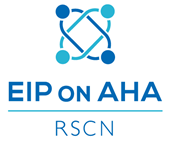Evolution of RSCN/AGs collaborative activities
The 2019 Conference of Partners of the EIP on AHA, held in Aarhus jointly with AAL community, highlighted the need to strengthen the ties between Reference Sites and Action Groups.
This is why A3 winter meeting has been jointly organized by the RSCN and A3 Action Group, with the objective of sharing a common approach to the scale-up of validated good practices in digital health.
The update of the Blueprint for the Digital Transformation of Health and Care provided a methodology to develop persona types, representing citizens needs in a matrix developed along life-course and complexity, and can support the innovative response to unmet health needs.
All working groups stated that, independently from the individual needs of older people, horizonal integration of care in the community settings has not been achieved yet in EU countries. Participants agreed on a common understanding, that Integration of care means person-centered integration of health and social care longitudinally provided across primary and secondary health care, also including citizens’ individual social, economic and human resources.
The joint effort of the workshop has been aimed at identifying the personas that RS prioritise, challenging the Action Groups in addressing jointly their unmet needs, based on the validated good practices they have been developing and with a strong engagement of end-users. This collaborative approach has been facilitating the identification of organizational, digital and sociocultural elements requiring customization to ensure adoption at a specific locoregional level, that have been flowing into a Joint Commitment between AGs and RS, that will be supported by the RSCN.
The bottom up perspective was adopted as a methodology by the professionals involved in the workshops, and represents a privileged pathway to achieve models validated on the field that are person-centred. Persons needs have been the starting point of any proposal in order to remain strictly adherent to solutions aimed at meeting a complex demand for care, cure and prevention. The next step is improving the capacity building of the working groups at grassroots level, in order to overcome the separate silos (like health and social care), that still represent the preferred approach of many stakeholders and countries. This step could become reality only if the working groups will be able to attract interest and funding for their proposals. Indeed, inadequate funding still hampers the activity of Reference Sites and EIPonAHA working groups. Joining forces in the prioritization of collaborative activities may contribute to funnel resources, hence the agreed focus of the first joint Commitment between RS and AGs: “Combining complementary and synergic good practices that will prevent frailty, maintain health and empower social capacity”, that will be developed in 2020.
